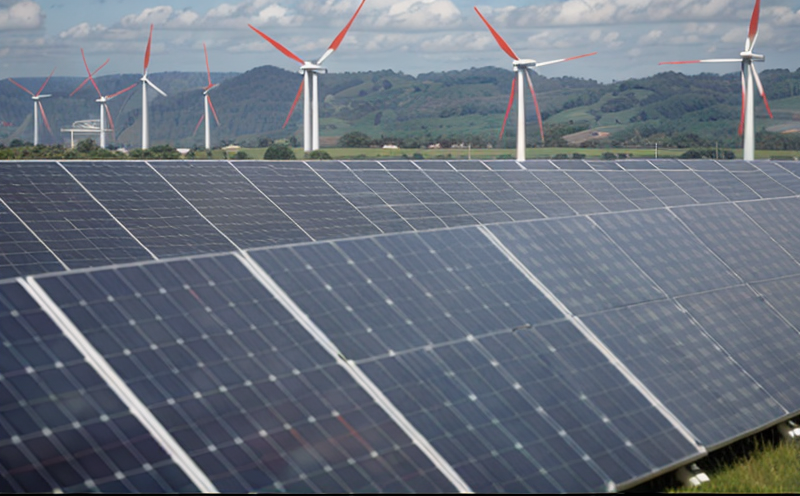Fourier Transform Infrared (FTIR) Spectroscopy of Biomass
In the realm of Agriculture & Forestry Testing, renewable energy systems have garnered significant attention due to their potential in sustainable development. One crucial aspect within this sector is the analysis and optimization of biomass, which plays a pivotal role in generating biofuels and bioproducts. Fourier Transform Infrared (FTIR) spectroscopy is an indispensable tool for quality managers, compliance officers, R&D engineers, and procurement specialists involved in this domain.
Biomass consists of various organic materials like agricultural residues, wood, and other plant-based resources that can be transformed into energy sources or chemical compounds. FTIR spectroscopy provides a non-destructive means to analyze the molecular composition of these materials. By examining the infrared absorption spectrum, researchers and industry professionals can identify functional groups within the biomass, which is crucial for understanding its potential as an energy source.
The technique works by shining infrared light onto the sample and observing how it interacts with different molecular bonds. This interaction produces a unique fingerprint that corresponds to specific chemical compounds present in the material. For biomass analysis, this means identifying sugars, cellulose, lignin, hemicellulose, and other components essential for biofuel production.
The application of FTIR spectroscopy in biomass testing enables precise characterization, which is vital for optimizing processes and ensuring compliance with international standards such as ISO 17826:2019. This precision helps in reducing waste, enhancing efficiency, and fostering innovation across the supply chain. By leveraging this technology, stakeholders can make informed decisions that contribute to a more sustainable future.
FTIR spectroscopy is particularly useful for monitoring quality throughout various stages of biomass processing—from raw material collection to final product formulation. It allows for real-time assessments which are critical in maintaining consistency and reliability in the supply chain. Moreover, it supports R&D efforts by providing insights into how different variables affect the chemical composition of biomass.
Understanding the molecular structure of biomass through FTIR spectroscopy can also aid in developing new technologies aimed at improving conversion rates of lignocellulosic materials into biofuels and other valuable products. This knowledge is essential for meeting increasing demands for cleaner energy solutions while minimizing environmental impact.
Applied Standards
| Standard | Description |
|---|---|
| ISO 17826:2019 | Methods for Determining the Composition of Biomass Materials by FTIR Spectroscopy |
| ASTM D5532-18 | Standard Practice for Sampling and Sample Preparation of Agricultural and Forestry Biomass |
| Biomass Component | Identified Functional Group | Corresponding FTIR Wavelength Range (cm⁻¹) |
|---|---|---|
| Sugars | Alcohol-OH, Ketone-C=O, Carboxylic Acid-COOH | 3600-3200 cm⁻¹, 1750-1720 cm⁻¹, 1250-1050 cm⁻¹ |
| Lignin | C-O-C, C-O-H, Ar-C=O, Ar-C-OH | 1630-1580 cm⁻¹, 1450-1370 cm⁻¹, 1290-1160 cm⁻¹ |
| Hemicellulose | C-O-C, C=O, O-H | 1750-1720 cm⁻¹, 1380-1340 cm⁻¹, 1250-1160 cm⁻¹ |
Eurolab Advantages
At Eurolab, we offer comprehensive FTIR spectroscopy services tailored specifically for biomass analysis. Our advanced instrumentation and experienced team ensure accurate results that meet strict international standards like ISO 17826:2019.
- High-resolution spectrometers capable of detecting subtle differences in molecular composition.
- State-of-the-art sample preparation facilities to handle diverse biomass samples.
- Experienced analysts who stay updated with the latest research and methodologies.
We provide timely turnaround times, ensuring that our clients receive their reports promptly. Additionally, we offer detailed interpretations of spectra which aid in making informed decisions about quality control measures or process improvements.
Beyond just providing data points, Eurolab helps bridge the gap between raw materials and final products by offering tailored solutions based on specific project needs. Whether it's optimizing feedstock selection for biofuel production or enhancing product performance through better understanding of raw materials, our expertise ensures that every step in the supply chain benefits from precise knowledge.
Customer Impact and Satisfaction
- Enhanced quality assurance through precise measurement of biomass components.
- Increased efficiency in optimizing production processes for bioenergy conversion.
- Improved decision-making capabilities based on detailed spectral data analysis.
- Better alignment with regulatory requirements thanks to accurate compliance testing.





